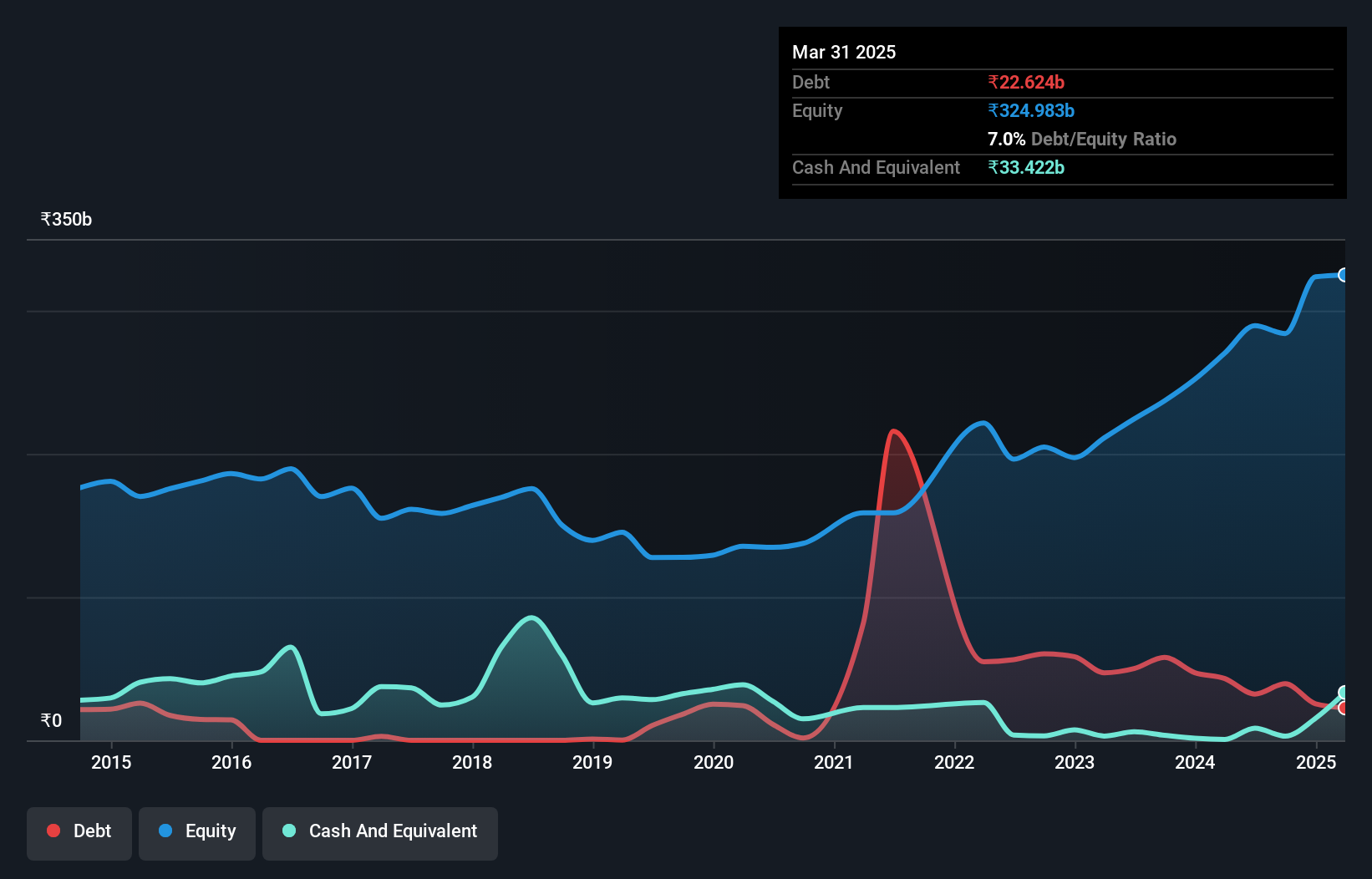- India
- /
- Telecom Services and Carriers
- /
- NSEI:INDUSTOWER
Indus Towers (NSE:INDUSTOWER) Could Easily Take On More Debt
David Iben put it well when he said, 'Volatility is not a risk we care about. What we care about is avoiding the permanent loss of capital.' So it seems the smart money knows that debt - which is usually involved in bankruptcies - is a very important factor, when you assess how risky a company is. Importantly, Indus Towers Limited (NSE:INDUSTOWER) does carry debt. But the more important question is: how much risk is that debt creating?
When Is Debt A Problem?
Generally speaking, debt only becomes a real problem when a company can't easily pay it off, either by raising capital or with its own cash flow. If things get really bad, the lenders can take control of the business. While that is not too common, we often do see indebted companies permanently diluting shareholders because lenders force them to raise capital at a distressed price. Of course, plenty of companies use debt to fund growth, without any negative consequences. When we examine debt levels, we first consider both cash and debt levels, together.
How Much Debt Does Indus Towers Carry?
The image below, which you can click on for greater detail, shows that Indus Towers had debt of ₹22.6b at the end of March 2025, a reduction from ₹43.1b over a year. However, it does have ₹33.4b in cash offsetting this, leading to net cash of ₹10.8b.

How Healthy Is Indus Towers' Balance Sheet?
The latest balance sheet data shows that Indus Towers had liabilities of ₹97.9b due within a year, and liabilities of ₹208.9b falling due after that. On the other hand, it had cash of ₹33.4b and ₹47.7b worth of receivables due within a year. So it has liabilities totalling ₹225.6b more than its cash and near-term receivables, combined.
While this might seem like a lot, it is not so bad since Indus Towers has a huge market capitalization of ₹1.09t, and so it could probably strengthen its balance sheet by raising capital if it needed to. But we definitely want to keep our eyes open to indications that its debt is bringing too much risk. While it does have liabilities worth noting, Indus Towers also has more cash than debt, so we're pretty confident it can manage its debt safely.
See our latest analysis for Indus Towers
On top of that, Indus Towers grew its EBIT by 67% over the last twelve months, and that growth will make it easier to handle its debt. When analysing debt levels, the balance sheet is the obvious place to start. But it is future earnings, more than anything, that will determine Indus Towers's ability to maintain a healthy balance sheet going forward. So if you want to see what the professionals think, you might find this free report on analyst profit forecasts to be interesting.
Finally, a business needs free cash flow to pay off debt; accounting profits just don't cut it. While Indus Towers has net cash on its balance sheet, it's still worth taking a look at its ability to convert earnings before interest and tax (EBIT) to free cash flow, to help us understand how quickly it is building (or eroding) that cash balance. Over the most recent three years, Indus Towers recorded free cash flow worth 72% of its EBIT, which is around normal, given free cash flow excludes interest and tax. This cold hard cash means it can reduce its debt when it wants to.
Summing Up
While Indus Towers does have more liabilities than liquid assets, it also has net cash of ₹10.8b. And we liked the look of last year's 67% year-on-year EBIT growth. So is Indus Towers's debt a risk? It doesn't seem so to us. The balance sheet is clearly the area to focus on when you are analysing debt. However, not all investment risk resides within the balance sheet - far from it. Case in point: We've spotted 1 warning sign for Indus Towers you should be aware of.
If, after all that, you're more interested in a fast growing company with a rock-solid balance sheet, then check out our list of net cash growth stocks without delay.
New: AI Stock Screener & Alerts
Our new AI Stock Screener scans the market every day to uncover opportunities.
• Dividend Powerhouses (3%+ Yield)
• Undervalued Small Caps with Insider Buying
• High growth Tech and AI Companies
Or build your own from over 50 metrics.
Have feedback on this article? Concerned about the content? Get in touch with us directly. Alternatively, email editorial-team (at) simplywallst.com.
This article by Simply Wall St is general in nature. We provide commentary based on historical data and analyst forecasts only using an unbiased methodology and our articles are not intended to be financial advice. It does not constitute a recommendation to buy or sell any stock, and does not take account of your objectives, or your financial situation. We aim to bring you long-term focused analysis driven by fundamental data. Note that our analysis may not factor in the latest price-sensitive company announcements or qualitative material. Simply Wall St has no position in any stocks mentioned.
About NSEI:INDUSTOWER
Indus Towers
A telecom infrastructure company, engages in the operation and maintenance of wireless communication towers and related infrastructures for various telecom service providers in India, Nigeria, Uganda, and Zambia.
Undervalued with solid track record.
Similar Companies
Market Insights
Community Narratives



